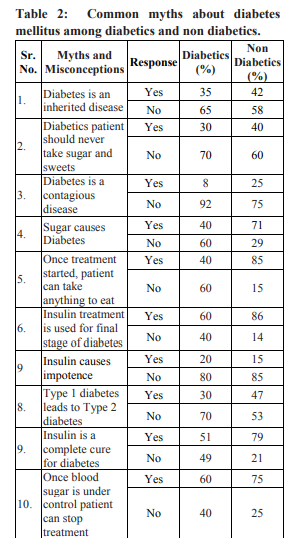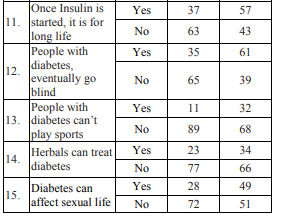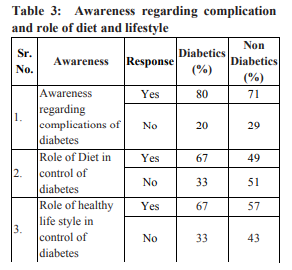IJCRR - 5(6), March, 2013
Pages: 26-30
Date of Publication: 30-Mar-2013
Print Article
Download XML Download PDF
MYTHS AND MISCONCEPTIONS REGARDING DIABETES MELLITUS AMONG DIABETIC AND NON-DIABETIC INDIAN POPULATION
Author: Abdullah Rehman, Umrana Mirza, Muneeb Jehan, Syed Arif Pasha
Category: Healthcare
Abstract:Myths prevailing about diabetes in the society have become a major hurdle for its proper treatment and control1. Aim: To determine the myths and misconception about diabetes mellitus and its prevention and treatment among diabetic and non-diabetic population. Research Methodology: It was a cross sectional study conducted in a teaching hospital of Hyderabad (Deccan College of Medical Sciences) during April, May and June 2009. A self explained, semi-structured and pretested proforma was used to collect data from purposively selected 300 Diabetic and 300 Non diabetic patients who accompanied them while visiting this institute for their treatment. Information was collected regarding sociodemographic background and their myths and misconceptions regarding diabetes after oral, verbal and written consent. Data was analyzed using SPSS software. Results: Commonest myth among diabetic (40%) and non diabetic patients (71%) was that eating more sweets and sugar causes diabetes. Others were, diabetes is a contagious or inherited disease, diabetes can affect sexual life, insulin causes impotence and it is the only available cure for diabetes. Myths were significantly more common among females, non-diabetics and less educated group. 20 % of the diabetics and 29% of non diabetics were unaware of the complications of diabetes. 21% diabetics 29 % of non-diabetics were unaware of the role of diet in control of diabetes. Conclusion: The prevalence of myths about diabetes is high among both diabetic and non diabetic population which could be associated with poor health seeking behavior and poor compliance with treatment
Keywords: Diabetes, Myths, treatment
Full Text:
INTRODUCTION
Diabetes mellitus is the most common metabolic disorder, its prevalence varying widely worldwide and ranging from as low as 50% The World Health Organization (WHO) estimates that more than 180 million people worldwide have diabetes. This number is likely to more than double by 20302 . In Keeping with scenarios of most developing countries, India has long passed the stage of diabetes epidemic. The problem has now reached pandemic proportions. It is a large public health problem growing astronomically every year. Apart from treatment of diabetes we need to pay attention to the prevention and health education of people about the diseases. Myths are defined as stories shared by a group of people which are a part of their cultural identity. They have a strong influence in the life of individuals and their way of living including seeking treatment during illness3 . This false collective beliefs become part of cultural identity and used to justify a social behavior. They have a strong influence in the life of Individuals and their way of living including seeking treatment during Illness. Myths have usually cultural and social backgrounds and usually they stay in a certain society if not challenged by scientific discourse. Lack of education, poverty, lack to health care facilities added with multiple ethnic, linguistic and cultural groups add up to the emergence of many myths. Educational level is protective against myths4 . Therefore, understanding the myths and misconceptions about diabetes mellitus is important in providing better care and health education to both patients and healthy individuals.
OBJECTIVE
To determine the myths and misconception about diabetes mellitus and its prevention and treatment among diabetic and non-diabetic population.
SETTINGS AND DESIGN
It was a cross sectional study conducted in a teaching hospital of Hyderabad (Deccan College of Medical Sciences) during April, May & June 2009. A self explained, semi-structured and pretested proforma was used to collect data from purposively selected 300 Diabetic and 300 Non diabetic patients who accompanied them while visiting this institute for their treatment. Information was collected regarding sociodemographic background and their myths and misconceptions regarding diabetes after oral, verbal and written consent. Data were analyzed using SPSS software. The questionnaire was developed based on international standards concerning the prevailing myths and misconceptions about diabetes mellitus5 . Total of 650 people approached our institute for their diabetes treatment which includes diabetic patients as well as non diabetic relatives or friends accompanying patients during the study period. Out of them 600 people got agree to participate in this research including diabetic patients as well as non diabetics. Ethical approval was obtained by ethical review committee of the study institute.
RESULTS
The current study was conducted in a tertiary care institution focusing on 300 diabetic and 300 non diabetic subjects visiting hospital along with patients and majority of them were males (58%). As shown in the table No.1 below, Majority of study group (39%) comprised of 30 to 50 years of age, while 20 % of the subjects were less than 30 years of age and 41 % of the subjects were of more than 50 years of age. Surprisingly, 31% of the subjects were illiterate and 41 % of them were educated up till 10th grade. High number of study subjects (45 %) were unemployed while out of those subjects, who were suffering from diabetes (300), 20 % were not on any treatment, 50 % were on drugs and 30 % were on insulin.



Table no 2 result shows that almost 35 % of diabetic subjects believe that diabetes is an inherited disease while almost 42 % non diabetics believed it so. 30 % of diabetics and 40 % non diabetics believed that diabetic patient should never take sugar and sweets. Surprisingly 8 % of diabetic and 25 % non diabetics thought that diabetes is a contagious disease. Almost 40 % diabetic and 71 % non diabetics said sugar causes diabetes. 40 % of diabetics believed that a patient can take anything to eat once the treatment has been started. 60 % diabetics believed that insulin is used for the final stage of diabetics and 20 % diabetics said it causes impotence. Almost 79 % of non diabetics believed insulin is a complete cure for diabetes and 57 % of it said once insulin is started, it is for life long. 30 % of diabetics said people with diabetes developed blindness at some point in time and 28 % diabetics believed that diabetes can affect sexual life too.

Above table no 3 shows awareness regarding complication of role of diet and life style in diabetes. Almost 20 % of diabetics and 29 % of non diabetics were not aware of complications of diabetes in our research while almost only 67 % diabetics and 49 % of non diabetics were aware of the role of diet in control of diabetes. Only 67% diabetics and 57 % of non diabetics were aware of the role of health life styles in the control of diabetes.
DISCUSSION
Myths prevail and stay in the societies due to lack of education, cultural beliefs and dogmas. These belief become such deep rooted that they sound true and get inculcated in successive generations. They may become slightly modified but stay in a society for a very long time unless challenged by scientific discourse. To change the behavior of the population we need to educate its masses6,7 . We don’t have many studies of the social aspects of many diseases and very meager literature is available based on the subject. We have however carefully collected almost all the myths and the results are surprising as these myths are common even in people who are educated, though less common than the uneducated lot. Many more such studies must be encouraged to enable us to prevent these myths from creating hurdles for scientific understanding of such common diseases. The most widely believed myth was that eating more sugar causes diabetes. This is not entirely true as it is not directly related to eating sugar, but is very much affected by diet in general. Some people also believe that soaking feet in water helps in decreasing blood sugar levels, a concept which is certainly not true. Some others are of opinion that herbal medicines are very effective in treatment of diabetes. These sections of people often present late to doctors and with complications as they first seek spiritual or herbal treatment. Nasir et al, reported high prevalence of such beliefs in spiritual treatment in Karachi, Pakistan. The prevalence of myths was found to be higher in females. This is almost similar to what was found in the study by Nasir et al in Pakistan8 . Educational status of people seemed to reduce their belief in the myths and they were better informed about the disease. This is similar to what was found by Nasir et al. This study therefore clearly reflects that prevalence of myths and misconceptions about diabetes and its treatment is high in our country and this could be a major hindrance in control and prevention of diabetes which is a disease of national importance. In a hospital based study carried out in India similar results were found. Twenty two percent of respondents believe that consuming sugar causes DM and myths were more common among females9 .
CONCLUSION
Myths and misconceptions about diabetes are prevalent in our society and this can have consequences upon the health seeking behavior of the people. In this study education is shown to be associated with decreased belief in myths. Myths and misconceptions are found to be highly prevalent among both even diabetics as well as non diabetics, though it was little less among diabetics in our research. We need to educate people about this disease and its preventive as well as treatment options. Advocacy of Diabetes program is highly encouraged to deal with the myths and misconceptions in the society.
ACKNOWLEDGEMENT
Author acknowledges the immense help received from the scholars whose articles are cited and included in references of this manuscript. The author is also grateful to authors / editors / publishers of all those articles, journals and books from where the literature for this article has been reviewed and discussed.
References:
1. Venkataraman , Kannan AT, Mohan V., Challenges in diabetes management with particular reference to India, Int J Diabetes Dev Ctries 2009 Jul; 29(3):103-9.
2. Global estimates for prevalence of diabetes mellitus and impaired glucose tolerance in adults. WHO Ad Hoc Diabetes Reporting Group. Diabetes care. January 1993;
3. Adler E, Paauw D. Medical myths involving diabetes. Prim Care 2003; 30:607-18.
4. Ben-Abdelaziz A, Drissi L, Tlili H, Gaha K, Soltane I, et al. Epidemiologic and clinical features of patients with type 2 diabetes mellitus in primary care facilities. Tunis Med 2006 84: 415–22
5. Rai M, Kishore J. Myths about diabetes and its treatment in North Indian population. International journal of diabetes in developing countries, Int J Diabetes Dev Ctries. 2009 Jul–Aug; 29(3): 129–132.
6. Funnell MM and Anderson RM. Empowerment and self-management education. Clinical Diabetes 2004; 22: 123–7.
7. Funnell MM, Anderson RM, Arnold MS, Barr PA, Donnelly MB, Johnson PD, et al. Empowerment: An idea whose time has come in diabetes patient education. Diabetes Educ. 1991;17: 37–41.
8. Nisar N, Khan IA, Qadri MH, Sher SA. Myths about Diabetes Mellitus among non diabetic individuals attending primary health care centers of Karachi suburbs. J Coll Physicians Surg Pak 2007; 17: 398-401.
9. Rai M, Kishore J. Myths about diabetes and its treatment in North Indian population. International journal of diabetes in developing countries, Int J Diabetes Dev Ctries. 2009 Jul–Aug; 29(3): 129–132
|






 This work is licensed under a Creative Commons Attribution-NonCommercial 4.0 International License
This work is licensed under a Creative Commons Attribution-NonCommercial 4.0 International License